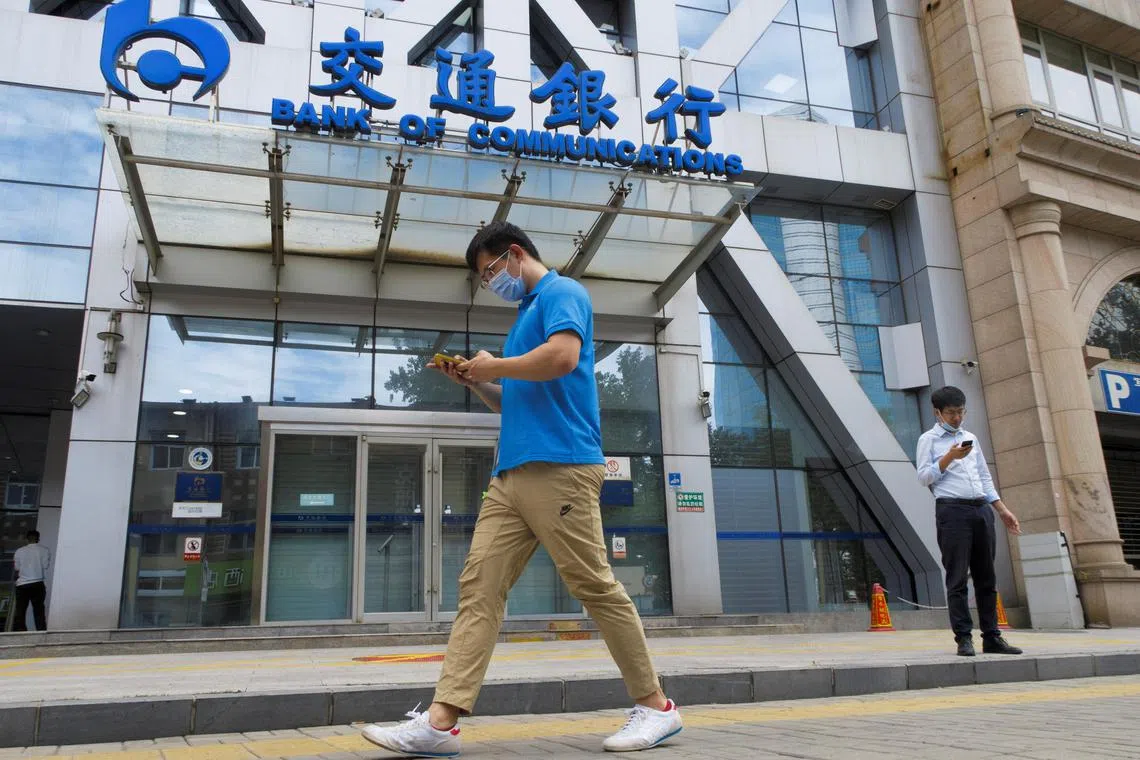China property crisis rippling through its biggest banks
Sign up now: Get ST's newsletters delivered to your inbox

Bank of Communications said its property bad loan ratio jumped to 4.99 per cent at the end of 2023, from 2.8 per cent a year earlier.
PHOTO: REUTERS
SHANGHAI - China’s protracted property downturn is eroding the balance sheets of the nation’s largest state banks as their bad loans are creeping up.
Bank of Communications (Bocom) reported on March 27 that its property bad loan ratio jumped to 4.99 per cent at the end of 2023, from 2.8 per cent a year earlier. While the balance of its overdue mortgages slipped, the special mention loans for the segment – a leading indicator of soured loans – jumped 23 per cent to 9.88 billion yuan (S$1.87 billion).
Its bigger rival, Industrial and Commercial Bank of China (ICBC), saw its bad loans from residential mortgages rise 9.6 per cent to 27.8 billion yuan, according to a filing on March 27. In the corporate loan segment, its property non-performing loan ratio was the highest among all sectors.
Both banks reported scant profit gains as interest margins narrowed. Bocom shares dropped as much as 4.9 per cent in Hong Kong in the morning and ICBC fell as much as 2.5 per cent.
The results offered a view into how the nation’s largest state-owned banks fared in the past year as Beijing tasked them with duties to help pump up the domestic economy as well as rescue its debt-laden property developers and local governments.
At the same time, the slowing economy has put downward pressure on interest rates.
The state banks have so far heeded Beijing’s call to lower lending rates and step up financing support for developers.
Bocom said China’s earlier cuts on loan prime rates and its reductions on outstanding mortgage interests hurt interest margins.
The bank also underwrote 56.5 per cent more real estate corporate bonds in 2023 to meet the financing needs of developers, it said in its filing.
ICBC maintained “stable and orderly” issuance of property loans and boosted financial support for rental housing, according to its statement.
China’s home price declines deepened in February in both new and used home segments, underscoring the challenge for the authorities to salvage the beleaguered market.
ICBC has increased efforts to manage risks associated with real estate developers and projects, according to the bank’s vice-president Wang Jingwu.
The non-performing loan ratio decreased by 0.77 per cent from the beginning of 2024, with sufficient provisions provided, he said.
As at the end of 2023, the balance of real estate loans and mortgages at ICBC was more than 7 trillion yuan, accounting for more than a quarter of its loan book.
Bocom’s vice-president Yin Jiuyong said the pressure to keep asset quality in check remains “immense” in 2024, as it will take time for home sales and developers’ liquidity conditions to recover.
Overall risk from its property exposure is still manageable, he said at an earnings briefing.
The big lenders’ profitability and asset quality are in focus as investors await to gauge their resilience in an economy that is heavily reliant on bank lending to regain momentum.
Combined profits at China’s commercial banks rose 3.2 per cent to 2.38 trillion yuan in 2023, the slowest pace since 2020, according to official data.
Outstanding bad loans climbed to a record 3.23 trillion yuan.
China Construction Bank, Bank of China and Agricultural Bank of China are scheduled to announce their annual results on March 28. BLOOMBERG


